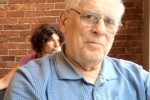Posts Tagged ‘
Husserl ’
Aug 29th, 2012 |
By Marc Applebaum

This PowerPoint presentation was developed for the first meeting of a seminar introducing psychology students to phenomenological psychological research, and assumes no prior knowledge of Husserl or continental philosophy. The descriptive phenomenological research method itself is introduced in depth over the course of the semester–this presentation is a “first taste” of Husserlian terms for students. Naturally, I added
[continue reading…]
Posted in Merleau-Ponty |
Comments Off on Applebaum: Introducing Husserl’s phenomenology to psychology students
Tags: Applebaum, Husserl
Aug 18th, 2012 |
By Marc Applebaum

This is the first in a series of our posts on central ideas in phenomenology—please add your observations, additions, or questions in the comments section! I’ll begin with what Husserl calls “the natural attitude.” In everyday life we see the objects of our experience such as physical objects, other people, and even ideas, as simply
[continue reading…]
Posted in Merleau-Ponty |
Comments Off on Key Ideas in Phenomenology: Applebaum on the Natural Attitude
Tags: Applebaum, Husserl, Merleau-Ponty
Jul 16th, 2012 |
By Marc Applebaum

In August 2011 Amedeo Giorgi was interviewed at Saybrook’s graduate conference on themes related to his life’s work in phenomenological psychological research. The panel was comprised of four former doctoral students of Giorgi’s at Saybrook: Drs. Lisa K. Mastain, Adrienne Murphy, and Sophia Reinders, and was moderated by Marc Applebaum. This transcript was edited by
[continue reading…]
Posted in Human Science |
3 comments
Tags: Giorgi, human science, Husserl, research
Jul 10th, 2012 |
By Marc Applebaum

During the current global recession rising suicide rates have being witnessed across Europe; this is echoed by American data on increases in suicides and depression. I invited philosopher Susi Ferrarello to reflect upon the rash of suicides amid Italy’s social crisis. –Marc Applebaum Phenomenology and the Representation of Personal Identity I am writing and working in a language
[continue reading…]
Posted in Human Science |
4 comments
Tags: cultural psychology, Ferrarello, Husserl, intersubjectivity, Merleau-Ponty, postmodernism
Jun 27th, 2012 |
By Marc Applebaum

Here is the presentation I gave in Montreal at the 31st International Human Science Research Conference. My aim was to encourage dialogue between interpretive and descriptive researchers, and clinicians whose work is informed by these perspectives. My premise about the complementarity of description and interpretation is based on Jitendra Nath Mohanty’s work on Husserl’s phenomenology.
[continue reading…]
Posted in Praxis |
Comments Off on Applebaum: Hermeneutics in Descriptive Phenomenology
Tags: Applebaum, Giorgi, hermeneutics, Husserl, research
Apr 26th, 2012 |
By Marc Applebaum
Husserl’s phenomenology is epitomized in his call for a return “back to the things themselves,” “Zurück zu den Sachen selbst.” We view this “return” as a shared project. The return, in other words, is intersubjective and not solipsistic: we return to the things in order to dialogue together about them together
[continue reading…]
Posted in Feature |
Comments Off on Welcome to the conversation
Tags: Giorgi, Husserl, intersubjectivity
Apr 23rd, 2012 |
By Marc Applebaum

As a phenomenological psychologist, I participate in the tradition of human science (Ger: Geisteswissenschaften). Since the foundation of this movement in the pioneering work of Giambattista Vico in the 18th century and Wilhelm Dilthey in the 19th, human science researchers have claimed that the study of human beings demands a radically different approach from that
[continue reading…]
Posted in Human Science |
Comments Off on Applebaum: Does Science Matter?
Tags: Applebaum, cultural psychology, human science, Husserl, psychotherapy
Apr 23rd, 2012 |
By Marc Applebaum

I teach and mentor graduate psychology students in Descriptive Phenomenological Psychology. Learning how to practice phenomenological research, students gain a lived-sense of the feature of consciousness that Edmund Husserl, drawing on the work of his teacher Franz Brentano, termed “intentionality”. Within Husserl’s phenomenology intentionality signifies (in part) that everything we can experience and know is
[continue reading…]
Posted in Praxis |
Comments Off on How Phenomenologists Listen
Tags: Applebaum, epoche, Husserl, intentionality, psychotherapy, reduction
Apr 23rd, 2012 |
By Marc Applebaum

“Husserlian phenomenology, in its search for meanings, is guided by respect for the given.” –Jitendranath Mohanty Practicing phenomenological psychology, whether as a researcher or as a clinician, means learning a craft. Its raw materials are the descriptions given to us by interview participants—or, if we are psychotherapists, by our clients. Our “tools” derive from the
[continue reading…]
Posted in Praxis |
Comments Off on The Craft of Phenomenology
Tags: Applebaum, Giorgi, Husserl, research
Apr 23rd, 2012 |
By Marc Applebaum

Community: from the Latin communis, meaning common, public, general, shared by all or many. Phenomenological psychology as expressed by Maurice Merleau-Ponty is an exploration intended to illuminate the shared psychological meanings and structures that we live pre-reflectively in daily experience. He offers an elegant example at the beginning of the essay Science and the Experience
[continue reading…]
Posted in Merleau-Ponty |
Comments Off on Applebaum: Phenomenology, community, and intercultural dialogue
Tags: Applebaum, Husserl, intersubjectivity, Merleau-Ponty, postmodernism








